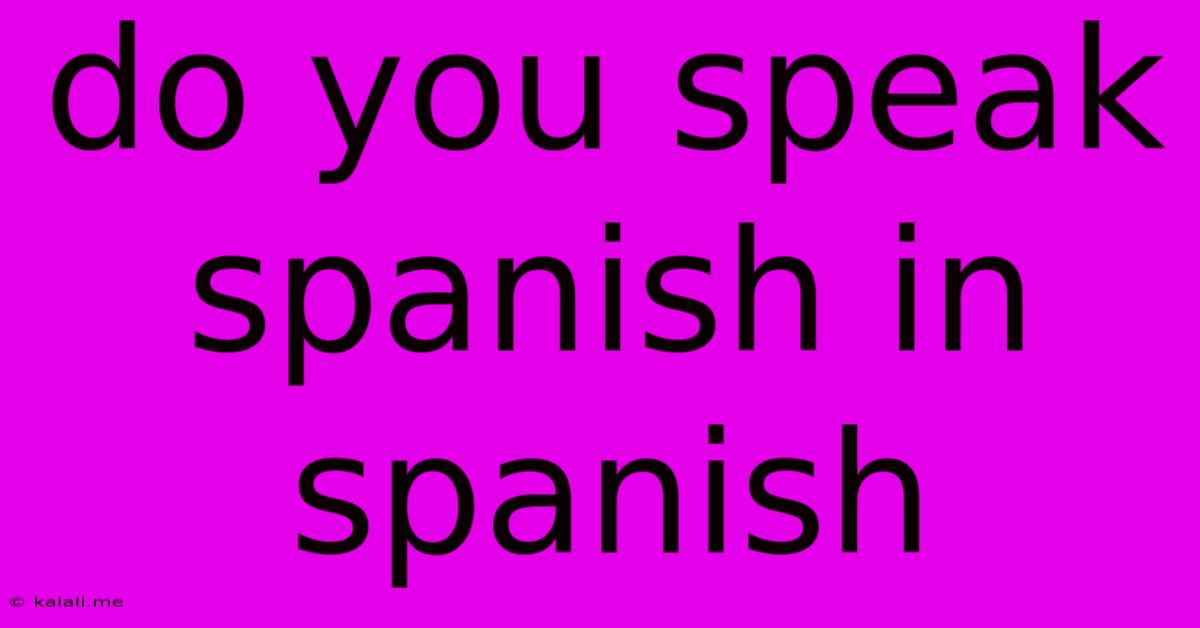Do You Speak Spanish In Spanish
Kalali
May 25, 2025 · 3 min read

Table of Contents
¿Hablas español? A Guide to Mastering the Question and its Nuances
So, you want to know how to say "Do you speak Spanish?" in Spanish? It's a simple question with a surprisingly rich context. This article will explore not just the literal translation, but also the cultural nuances and different ways to ask this crucial question, helping you navigate conversations with Spanish speakers confidently.
This article covers the basics of asking "Do you speak Spanish?" in Spanish, including formal and informal options, common variations, and cultural considerations to ensure you're communicating effectively. It's a crucial phrase for travelers, language learners, and anyone looking to connect with the Spanish-speaking world.
The Basic Translation: "¿Hablas español?"
The most straightforward translation of "Do you speak Spanish?" is "¿Hablas español?" This is the informal version, suitable for friends, family, and people you know well. It uses the informal "tú" form of "you."
The Formal Version: "¿Habla usted español?"
For more formal situations, such as interacting with strangers, elders, or people in positions of authority, you should use the formal version: "¿Habla usted español?" This uses the formal "usted" form of "you." Remember, using the correct form is essential for showing respect and demonstrating cultural sensitivity.
Beyond the Basics: Alternative Ways to Ask
While "¿Hablas español?" and "¿Habla usted español?" are the most common ways to ask, there are other, equally valid options depending on the context. These include:
- "¿Entiendes español?" This translates to "Do you understand Spanish?" This is useful if you're unsure if someone can hold a full conversation but might understand basic phrases.
- "¿Sabes hablar español?" This means "Do you know how to speak Spanish?" It's a slightly more formal way of asking the same question.
- "¿Te manejas en español?" This translates to "Do you manage in Spanish?" or "Can you get by in Spanish?". This is a more colloquial and less direct way of asking, suggesting you're interested in their level of fluency.
Cultural Considerations: More Than Just Words
Asking "¿Hablas español?" isn't just about grammar; it's about cultural sensitivity. The way you ask and the context are crucial. Consider these points:
- Tone of voice: A friendly and respectful tone is always appreciated.
- Body language: A smile and open posture can make a big difference.
- Context: Consider where you are and who you're talking to. In some situations, simply speaking slowly and clearly in Spanish might be better than explicitly asking.
Mastering the Response
Understanding how to ask the question is only half the battle. Being prepared for the response is equally important. Here are some common responses and how to react:
- "Sí, hablo español." (Yes, I speak Spanish.) – This is a straightforward affirmative response.
- "Sí, un poco." (Yes, a little.) – This indicates limited fluency. Adjust your speech accordingly, using simpler sentences and slower pronunciation.
- "No, lo siento." (No, I'm sorry.) – Be prepared to switch to English or another language you both share.
- "Habla inglés?" (Do you speak English?) – This is a polite way to offer an alternative if they don't speak Spanish.
By understanding the nuances of asking "¿Hablas español?", you'll be well-equipped to communicate effectively and respectfully in Spanish-speaking environments. Remember, language learning is about more than just words – it's about cultural understanding and connection.
Latest Posts
Latest Posts
-
How To Export All Notes From Mac
May 25, 2025
-
Aluminum Foil Stuck To Bottom Of Oven
May 25, 2025
-
Why Does My Shower Randomly Releases Water
May 25, 2025
-
On My End Or In My End
May 25, 2025
-
Minecraft Failed To Login Invalid Session
May 25, 2025
Related Post
Thank you for visiting our website which covers about Do You Speak Spanish In Spanish . We hope the information provided has been useful to you. Feel free to contact us if you have any questions or need further assistance. See you next time and don't miss to bookmark.